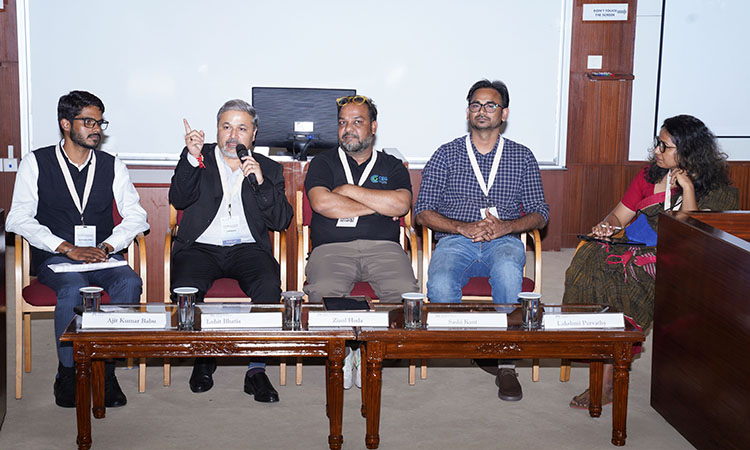Panel Discussion on Workforce Transitions Trends at XX International Conference on Public Policy and Management

The panel discussion was titled, ‘State Capacity and Informal Labour Markets in Contemporary India’
20 August, 2025, Bangalore: The XX annual International Conference on Public Policy and Management hosted by the Centre for Public Policy featured a compelling panel discussion titled, ‘State Capacity and Informal Labour Markets in Contemporary India’, addressing India’s dynamic labour market, workforce transitions, and the role of state capacity in shaping employment outcomes on August 19, 2025 at IIMB. The session brought together leaders and academics, Dr. Shashi Kanth, MARS, Lohit Bhatia, President, Workforce Management, Quess Corp Limited, Ziaul Hoda, Vice President, Centre for Effective Governance of Indian States, CEGIS, and Dr. Ajit Kumar Babu, Economics area, M. S. Ramaiah University. The panel discussion was moderated by Dr. Lakshmi Parvathy, Public Policy and Sociology area, IIMS.
Dr. Shashi Kanth spoke on the informal labour market and policy flexibility, emphasizing that digital integration of labour contracts and flexible regulations are essential, as one policy might not fit all. He highlighted the critical need for workers to understand their rights and benefits to transition from informal to formal employment.
Lohit Bhatia underscored the diverse forms of employment in India, noting that every organization manages a mix of permanent, temporary, apprenticeship, consultancy, and gig workers. He shared startling national statistics: 79% of the population in India is dependent on informal work, and highlighted labour force participation at 55%, well below the global average, with female participation at just 37%. Bhatia stressed that formalization and awareness of benefits are key to empowering workers.
Ziaul Hoda focused on state capacity and the challenges of policy implementation. He explained that while India has strong labour policies, “unfilled vacancies and capacity gaps hinder effective execution.” Ziaul also pointed out the demographic shifts, noting that 20% of the population is aging, requiring proactive workforce planning.
Dr. Ajith Kumar offered insights into migration-driven transitions, explaining that “the transition is not linear” and that urban migration often creates both income opportunities and social inequalities. He detailed how assignment-based migration fosters skill specialization while reinforcing caste- and gender-based disparities.
“Most young migrants work long hours in cities not just for income, but to achieve social mobility and personal aspirations,” he noted, illustrating how economic opportunity drives migration and shapes workers’ lives.
Panel Discussion on Workforce Transitions Trends at XX International Conference on Public Policy and Management
The panel discussion was titled, ‘State Capacity and Informal Labour Markets in Contemporary India’
20 August, 2025, Bangalore: The XX annual International Conference on Public Policy and Management hosted by the Centre for Public Policy featured a compelling panel discussion titled, ‘State Capacity and Informal Labour Markets in Contemporary India’, addressing India’s dynamic labour market, workforce transitions, and the role of state capacity in shaping employment outcomes on August 19, 2025 at IIMB. The session brought together leaders and academics, Dr. Shashi Kanth, MARS, Lohit Bhatia, President, Workforce Management, Quess Corp Limited, Ziaul Hoda, Vice President, Centre for Effective Governance of Indian States, CEGIS, and Dr. Ajit Kumar Babu, Economics area, M. S. Ramaiah University. The panel discussion was moderated by Dr. Lakshmi Parvathy, Public Policy and Sociology area, IIMS.
Dr. Shashi Kanth spoke on the informal labour market and policy flexibility, emphasizing that digital integration of labour contracts and flexible regulations are essential, as one policy might not fit all. He highlighted the critical need for workers to understand their rights and benefits to transition from informal to formal employment.
Lohit Bhatia underscored the diverse forms of employment in India, noting that every organization manages a mix of permanent, temporary, apprenticeship, consultancy, and gig workers. He shared startling national statistics: 79% of the population in India is dependent on informal work, and highlighted labour force participation at 55%, well below the global average, with female participation at just 37%. Bhatia stressed that formalization and awareness of benefits are key to empowering workers.
Ziaul Hoda focused on state capacity and the challenges of policy implementation. He explained that while India has strong labour policies, “unfilled vacancies and capacity gaps hinder effective execution.” Ziaul also pointed out the demographic shifts, noting that 20% of the population is aging, requiring proactive workforce planning.
Dr. Ajith Kumar offered insights into migration-driven transitions, explaining that “the transition is not linear” and that urban migration often creates both income opportunities and social inequalities. He detailed how assignment-based migration fosters skill specialization while reinforcing caste- and gender-based disparities.
“Most young migrants work long hours in cities not just for income, but to achieve social mobility and personal aspirations,” he noted, illustrating how economic opportunity drives migration and shapes workers’ lives.
